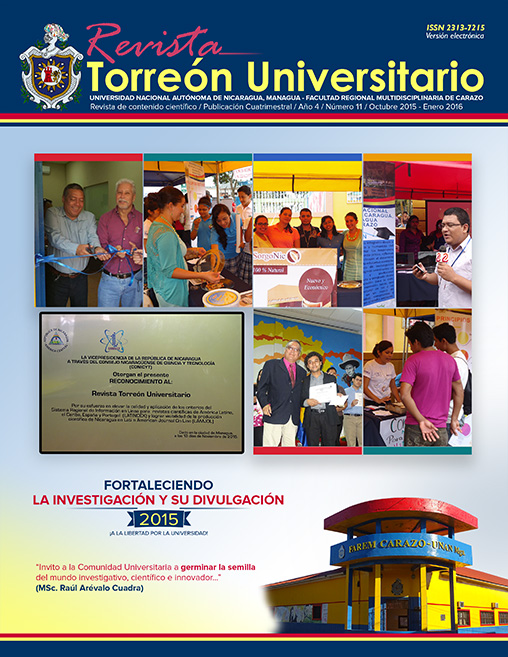La metacognición y las habilidades intelectuales de orden superior
Resumen
En la “era del conocimiento” los enfoques de enseñanza-aprendizaje memorísticos no son pertinentes. El interés ahora es formar personas capaces de aprender para la vida, resolver problemas complejos, pensar creativa y críticamente, etc. La meta es lograr que los estudiantes desarrollen las habilidades intelectuales de orden superior. Después de haber hecho una revisión de la literatura metacognitiva, se sugiere que la estrategia de enseñanza-aprendizaje conocida como “pensar en voz alta durante la resolución de problemas”, puede contribuir al desarrollo de las habilidades intelectuales de orden superior.
Descargas
Referencias
ARREDONDO, M. C. (2007). Habilidades básicas para aprender a pensar. Editorial Trillas. México D.F.
AZEVEDO, R. Y ALEVEN, V. (2013). The international handbook of metacognition and learning technologies. Springer International Handbooks of Education, 28. doi: 10.1007/978-1-4419-5546-3
BJORK, R. A. (1994). Memory and metamemory considerations in the training of human beings. In J. Metcalfe and A. Shimamura (Eds.), Metacognition: Knowing about knowing (pp.185-205). Cambridge, MA: MIT Press.
CHIU, J.L. Y CHI, M.T.H., (2014). Supporting self-explanation in the classroom. Applying the science of learning in Education.
DUNLOSKY, J., RAWSON, R., MARSH, E.J., NATHAN, M.J. Y WILLINGHAM, D.I. (2013). Improving students´ learning with effective learning techniques: promising directions from Cognitive and Educational Psychology. Association for Psychological Science, 14(1) 58 DOI: 10.1177/1529100612453266
FERREIRO, R. (2012). Cómo ser mejor maestro: el método ELI. México. Editorial Trillas.
FLAVEL, J. H. (1979). Metacognition and cognitive monitoring: a new area of cognitive and developmental inquiry. American Psychologist 34, (10), p. 906-911
GIRASH, J. (2014). Metacognition and instruction. In applying the science of learning in education: infusing psychological science into the currículum. American Psychological Association.
GRAESSER, A. C. (2009). Inaugural editorial for Journal of Educational Psychology. Journal of Educational Psychology, 101, 259-261.
HACKER, R. J. (1998). Verbalization and problem solving. Taylor & Francis e-library.
KAPUR, M. Y BIELACZYC, K. (2012). Designing for productive failure. Journal of the Learning Sciences, 21(1), 45–83. doi: 10.1080/10508406.2011.591717
KLIMENKO, O. Y ALVAREZ, J.L. (2008). Aprender cómo aprendo: la enseñanza de las estrategias metacognitivas. Educación y Educadores, 12, 11-28. Recuperado de http://www.redalyc.org/pdf/834/83412219002.pdf
MARTON, F. Y SALJO, R. (1976) On qualitative differences in learning - 1: outcome and process. British Journal of Educational Psychology, 46, 4-1
MEICHENBAUM, D., Y BIEMILLER, A. (1998). Nurturing independent learners: helping students take charge of their learning. Massachusetts: Brookline Books
METACOGNITION (2016). In Merriam-Webster.com. Recuperado de: http://www.merriam-webster.com/dictionary/metacognition
BALLESTA, O. (2016). Mundial en su “Futuro del Trabajo: Empleo, Habilidades, y Estrategias de la Fuerza Laboral para la Cuarta Revolucion Industrial” (The Future of Jobs: Employment, Skills and Workforce Strategy for the Fourth Industrial Revolution, en inglés) Disponible en: https://talentoenexpansion.com/2016/02/01/el-futuro-del-trabajo-del-trabajo-en-la-cuarta-revolucion-industrial/
OECD (2013). PISA 2015 Draft Reading Literacy Framework. Disponible en: https://www.oecd.org/pisa/pisaproducts/Draft%20PISA%202015%20Science%20Framework%20.pdf
OECD. (2008). 21 century learning: research, innovation and policy. Directions from recent OECD analysis. Disponible en: https://www.oecd.org/newsroom/40556222.pdf
PERKINS, D. N., y GROTZER, T. A. (1997). Teaching intelligence. American Psychologist, 52, 1125–1133.
ROEDIGER III, H.L., Y PYC, M.A. (2012). Inexpensive techniques to improve education: applying cognitive psycology to enhance educational practice. Journal of Applied Research in Memory and Cognition, 242-248.
SADLER, D. R. (1989). Formative assessment and the design of instructional systems. Instructional Science,18(2), 119-144. doi: 10.1007/bf00117714
SCHELLINGS, G.L.M., BROEKKAMP H. (2011). Signalling task awareness in think aloud protocols. Metacognition Learning 6:65–82. DOI 10.1007/s11409-010-9067-z
SCHUNK, D. H. (1994). The self-efficacy perspective on achievement behavior. Educational Psychologist, 19,199-218.
TRILLING, B. Y FADEL, C. (2009). 21-century skills for life in our times. John Wiley & Sons, Inc. Printed in the United States of America.
VEENMAN, M.V.J., WILHELM, P. Y BEISHUIZEN, J.J. (2004). The relation between intellectual and metacognitive skills from a developmental perspective. Learning and Instruction (pp.89-109). ELSEVIER. doi: 10.1016/j.learninstruc.2003.10.004
WHIMBEY, A., LOCKHEAD, J., Y NARODE, R. (2013). Problem solving and comprehension. Routledge Taylor y Francis Group: New York (7ma ed.).
WHITE, B., FREDERIKSEN, J., Y COLLINS, A. (2008). The interplay of scientific inquiry and metacognition.
Descargas
Publicado
Número
Sección
Licencia
The authors who publish in this journal agree to the following terms.
- The author or authors of the articles, essays or research grant the National Autonomous University of Nicaragua, Managua (UNAN-Managua) the editing rights (copyright) of the submitted work, therefore the University has the exclusive right to publish the article for the entire copyright period.
- These copyrights/authors authorize Torreón Universitario Magazine and the University to edit and disseminate/publish the article in said Magazine, including printed and electronic reproduction, storage, retrieval and any other type of publication, and sources of secondary information as services. of summaries and databases, they also empower it to protect the article against unauthorized use for dissemination by printed or electronic media (PDF, HTML, EPUB, XML or others).
License for use of content
The magazine uses the Creative Commons Attribution-NonCommercial-NoDerivs 4.0 International License.
Under this statement:

This journal is licensed under a Creative Commons Attribution-NonCommercial-NoDerivatives 4.0 International License. It can be copied, distributed and transmitted publicly as long as the author and source are cited (Revista Torreón Universitario), it should not be modified or used for any commercial purpose. The full license can be found at http://creativecommons.org/licenses/by-nc-nd/4.0/.



